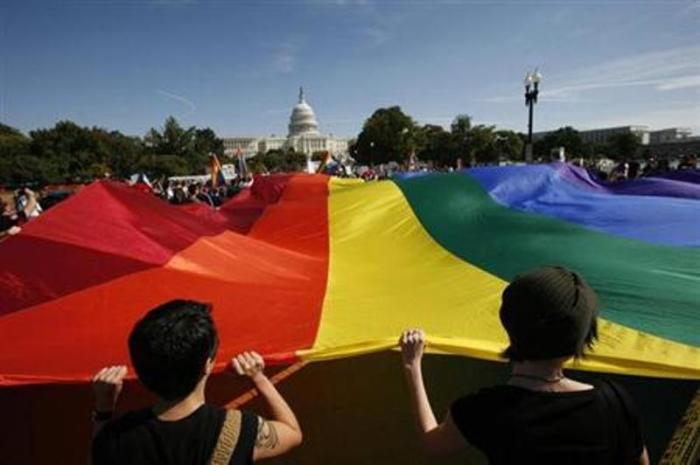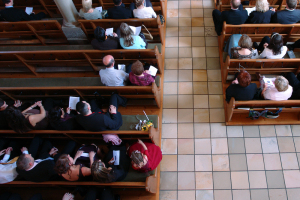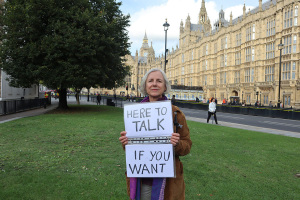'Gay' Should Not Be Part of the Christian Identity, Says McKrae Game (Part 2)
In the second part of The Christian Post's interview with McKrae Game, president and founder of Hope for Wholeness, the ordained Southern Baptist minister explains why people should stop using the term "gay Christian" and how his organization differs from Exodus International, which closed last year after serving people with unwanted same-sex attraction for 37 years. Game, who left the homosexual lifestyle, also acknowledges that he is living in "denial," though he defines the term differently. Part one of the interview can be read here.

CP: Let's talk about the term "gay Christian." How do you feel about it, and is there a better term that we should be using?
Game: I do not like the term. I'm not a person who is politically correct. I don't say things to try and make people like me or anything like that. But I read the book Washed and Waiting by Wesley Hill to try and understand these growing groups of people — I'm obviously not one of them — who call themselves gay Christians.
Justin Lee came up with the term Side A and Side B [regarding beliefs about Christianity and the Scriptures].
Side A is the belief that God blesses gay marriage, and Matthew Vines is Side A as well, which believes that Scripture was improperly translated and there's nothing wrong with homosexuality. That is essentially Side A. So when they say gay Christians, they mean, practicing homosexuals.
Side B means that Scripture is correct. It has not been improperly translated, and homosexuality is not permissible for a Christian. But to call yourself a gay Christian is the only way to truly be honest.
We should not judge or condemn people who refer to themselves as a gay Christian, but we should ask: "What do you mean by that?" Because they don't all mean the same thing when they use that terminology.
Also, don't condemn them because hopefully, if they are really a Christian, then the Holy Spirit is going to bring them under conviction of either their terminology or their lifestyle. And try and get in relationship with them to bring them in right correction.
I don't believe we should call ourselves gay. Can you imagine an adulterous Christian, or a drunk Christian? It's kind of a ridiculous statement. It's what the gay community has fashioned to, I guess, make themselves feel better.
We should be calling ourselves anything that is honoring to God.
I Am is the name of God. Moses asked, "Who do I say sent me?" He said, "Say 'I Am sent you.'"
I think anything after "I am" should be God honoring. I am a father; I am a husband; I am a realtor; I am a doctor.
If it's in Scripture, saying it (homosexuality) separates us from God, why should we put that as a part of our identity? I think that's very poor communication if you're trying to be in right standing with God and the Christian community.
CP: Now that the conference is over, what are some of the takeaways that you want people to hold onto and think about as they get back into their daily routines in life? (Hope for Wholeness hosted a four-day conference in North Carolina called "Hope Rising" to help people with same-sex attraction realize that "God does change lives and Christians do not have to accept a gay identity.")
Game: In a general session, which I taught, I said to them, "After this is all over, after this is all said in done, what I want you to remember is the first half of 1 Corinthians 10:13. It's a verse we don't hear very much in church, and it says, 'There is no temptation that is overcome you but what is common to man.'"
And we tend to believe that what we are tempted in is unique to us. I believe that it is the tool of the enemy for us to believe this.
Some people get brave enough to tell their pastor or a friend or a family member about their same-sex attraction. And I asked people this question: Has a pastor, counselor or someone said to you, "OK, good, just don't tell anybody else and we'll just keep this between the two of us?"
A bunch of people raised their hands. I said, that's a lie from the pit of hell. James 5:16 says, "Confess your sins one to another, so that you may be healed. The effectual fervent prayer of a righteous man availeth much."
I said, we need the community of Christ to walk this life. Then I said, raise your hand if keeping things secret has helped you.
I encourage people to tell their stories. There's so much to share around this issue. You've got the gay community saying, come out, tell everybody you're homosexual. Then you've got the Christian community saying, put that all behind you and don't tell anybody.
What about Revelations 12:11 that says, "They overcame him by the blood of the Lamb, and by the word of their testimony; and they loved not their lives unto death." And Romans 11, and all these other verses.
Our testimony has power and a lot of people feel that they don't have a testimony because they haven't arrived, because they still might have same-sex attractions or they still might struggle.
And so, trying to encourage people to see God working in their life where they are, and not having to fit into some square box and a round hole kind of thing.
You can hear that and extrapolate, what is he actually saying in that? Is he saying something like Gay Christian Network, you can be gay and Christian too? No, I'm not saying that at all, because I believe we are to live a repentant, submitted life to Christ.
I have a family member who told his father, "Well, McKrae is just living in denial." I came out of homosexuality 23 years ago. I've been married for 18 years, have two great kids, love my wife and have a great marriage. But I still have same-sex attractions, I just admit those in accountability and in transparency.
My reply to my family member was, "Well, you can tell your son he is exactly right." I am absolutely in denial. Scripture tells me to deny myself; to pick up my cross and follow Him. It tells me if man is willing to lay down his life he'll find Him.
And so, yes, I am denying myself. I learned a long time ago that you're not going to win trying to communicate by the world's terminology. We're either going to work from a biblical framework, or we're going to work from a worldly framework; the two can't be intertwined.
I try to encourage people to share with their pastor. If they're married, they need to share with their wives; if they have children who are old enough, they need to share with their children, and their parents and friends because we can't do life alone.
We need help in life. And it doesn't matter whether your struggle is same-sex attraction or if it's heterosexual attraction, gossip, or whatever it is, we need each other.
The powerful thing about a network like this, ministries like this, is it's hard for the church to understand this issue, and people like me are needed to help the church understand this issue. But people who are new to the journey, they want to hear my and other people's stories because it helps them.
CP: After Exodus International closed down a year ago, your organization has continued to help people with same-sex attraction. In what ways is Hope for Wholeness similar to Exodus, and what are you going to be doing differently?
Game: Exodus closed June 19, 2013, and I was there. I knew that ministry leaders and people were hurt and upset, so we got a conference together as quickly as we could and we had a conference last fall in Greenville, South Carolina. We had a pretty good turnout and Stephen Baldwin spoke at the banquet. We had about 78 to 80 participants, and about 45 leaders, and 250 to 300 people who attended the banquet.
What we are carrying on that was the good of Exodus is the annual conference that has speakers and classes and social groups for people to have community, sharing, a prayer team and powerful praise and worship. And a network and standards to ensure integrity — we have all of those good things.
What we will not be carrying on is how the messaging was communicated. I believe that's why Exodus was closed.
I don't feel called to speak to the homosexual community in a way that won't offend them overtly, but I'm not going to speak in such a way that will offend them. I'm trying not to offend them, but I know that I will offend them. I know that my very existence and the organization does offend them, and I have to live with that.
Again, I don't believe people should be calling themselves a gay Christian. I don't believe people should be practicing homosexuality. I don't believe we should be practicing any life-dominating lifestyle and feel like we're honoring God.
I'm not going to say who's going to heaven or who's going to hell. I'm not God; I'm not their judge. And so, I think what got involved in the end is saying who is and who isn't going to heaven. I'm not the most skilled or talented orator, but neither was Moses, and God worked through him.





























